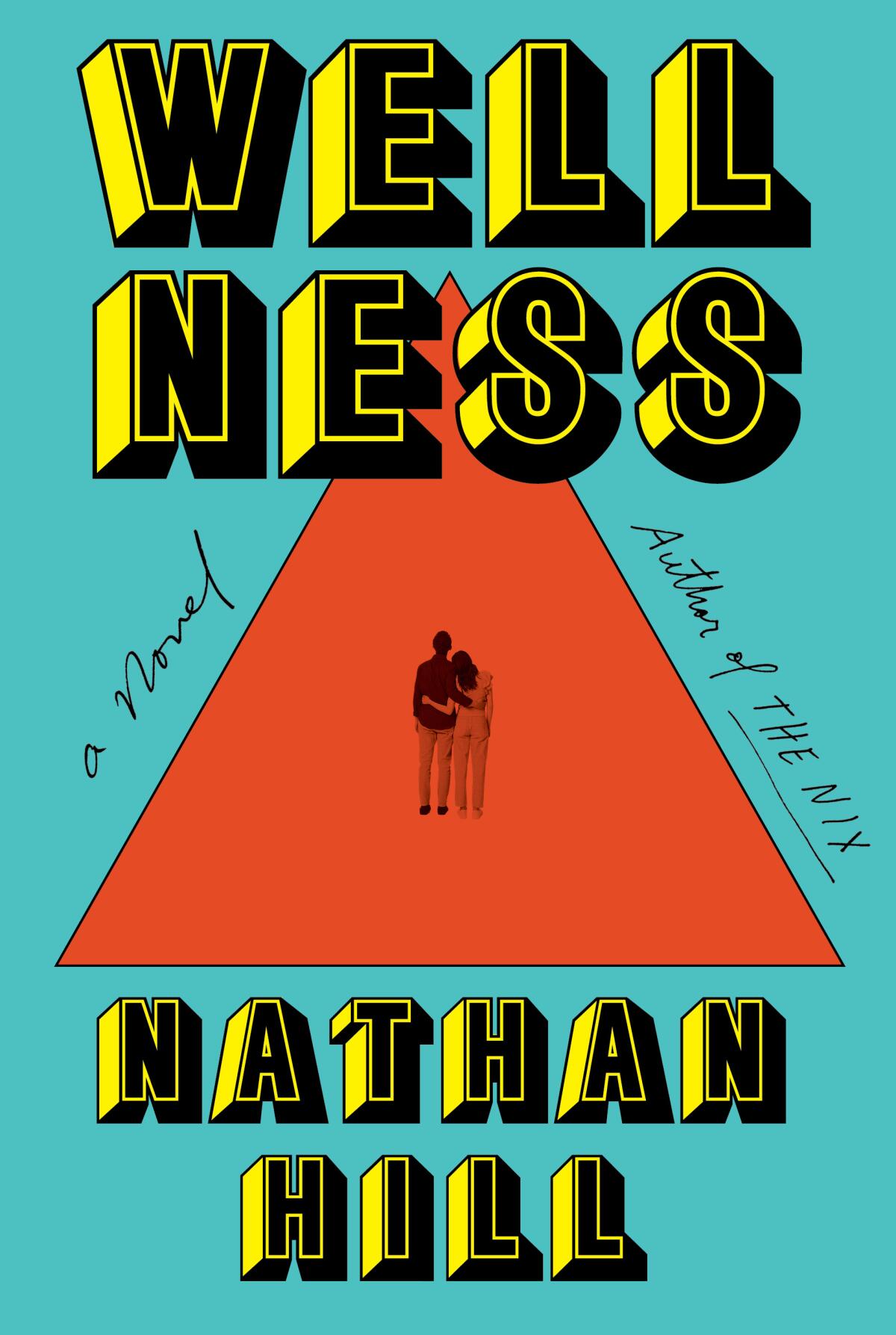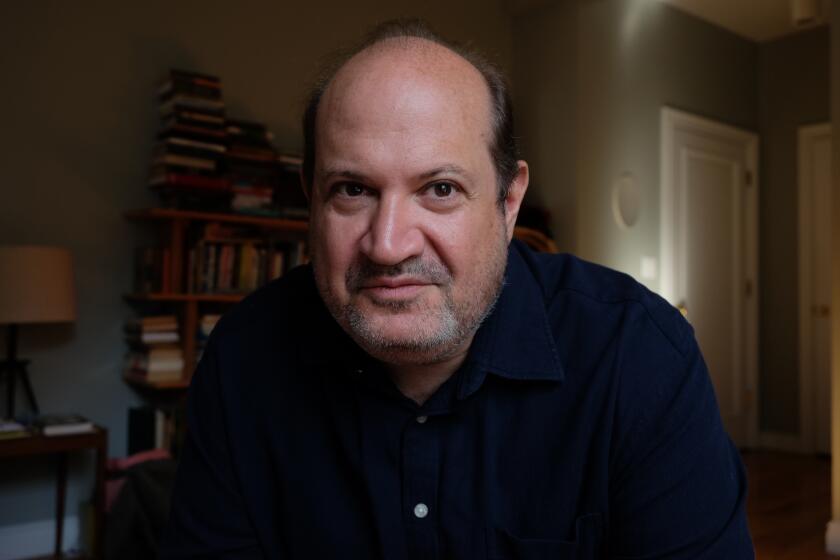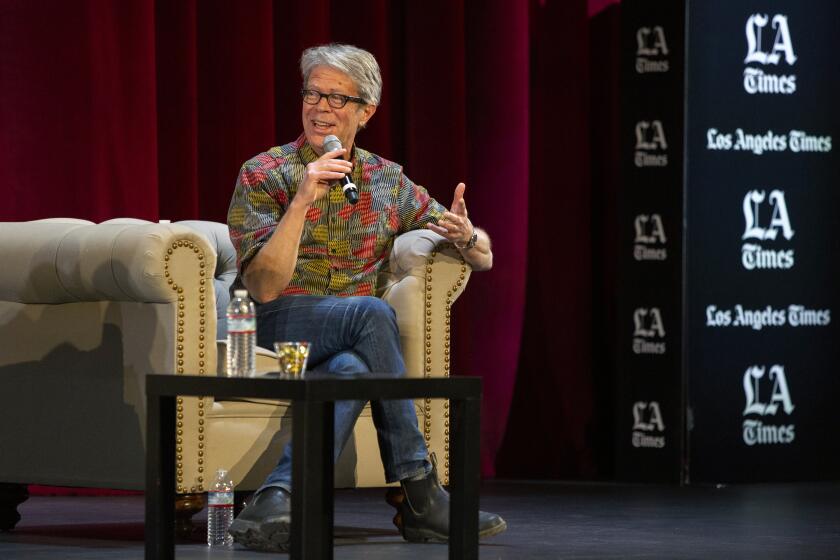Did Gen X sell out? In Nathan Hill’s stealthy new satire, it’s way worse than that

Review
Wellness
By Nathan Hill
Knopf: 624 pages, $30
If you buy books linked on our site, The Times may earn a commission from Bookshop.org, whose fees support independent bookstores.
Let’s spin the wheel of literary fiction tropes, shall we? Watch them whirl by: Behold My Trauma; Adolescence Is Hell; We Are Being Manipulated by Unseen Forces; We Have Lost Our Essential Connection to Nature; and so on. Slowing down, we eventually arrive at the theme of Nathan Hill’s second novel, “Wellness”: Unhappy Suburban Marriage. But wait, there’s more! And thank God for that.
The couple in this case is Jack and Elizabeth, who connect at a time (early ‘90s) and place (Chicago’s Wicker Park neighborhood) that was a crucible for Gen X culture — anti-corporate, distrustful of authority, enchanted with provocative art and the nascent web. The two meet at a club where Liz Phair is playing between sets, and they find some common ground despite their differences: He’s a photographer, the son of a Kansas ranching family; she’s a budding psychologist, the scion of an East Coast brood floating on ill-gotten wealth. (One ancestor was a clothier to the Klan.)
In “No One Left to Come Looking for You,” Sam Lipsyte, master Gen-X satirist, follows a shambolic ’90s punk band through a grungy New York mystery.
Perhaps love, they figure, can be something not unlike the early web, before the advertisers and algorithms arrived. Freeing instead of restraining. “You don’t have to prostrate yourself to the usual conformist rules,” a friend tells Jack, explaining hyperlinks but not just that. “You’re free to be your weird and wild self. So it’s a more honest place, less fraudulent, more real.”

Fast-forward to 2014, and — nope. Jack, an art teacher, is being forced to demonstrate his viral influence to earn even his paltry wage as an adjunct professor. Elizabeth has transformed her firm, Wellness, into a snake-oil factory, selling a host of placebos fit for hawking by InfoWars and other shady operators. Now desperate to conform with their well-off neighbors in a Chicago suburb while also proving themselves as free spirits (maybe a trip to a sex club will help?), they let their marriage short-circuit.
If “Wellness” stayed in this lane, it’d hardly be worth its heft. The last thing American letters need is a John Updike rehash. But the surprising, entertaining thing about “Wellness” is how it delivers a kind of trope twist: About midway through, the wheel starts to subtly tick back to We Are Being Manipulated by Unseen Forces. Our lives, even our most intimate ones, Hill suggests, are susceptible to a series of false narratives, propped up by conspiracy theories, placebo effects and self-delusion.
Indeed, the novel implies, delusion may be the one thing that unites us as Americans. Elizabeth’s wealthy soccer-mom friend is seduced by prosperity-gospel thinking and anxiety that “low-vibration people” will invade her neighborhood. Jack’s father is, in an excellent set piece, slowly manipulated by Facebook’s algorithm into a sort of MAGA lab rat. Social media is exposed as “a machine that turns terror into money.”
The reigning poet of Twitter, also a memoirist, aims to capture the emptiness of social media, and then transcend it, in “No One Is Talking About This.”
We know all this, don’t we? Yet here we are, reading a novel, which means we are primed for a story, even if we’re misled by it. Hill is witty at exposing the ways intelligence and social background don’t necessarily make us more immune to manipulation. Want to take down a property development? Spin a tale about sacred grounds and historical protections. When college-age Jack is caught in a scheme to download scads of porn on school computers in the screeching-modem era, he spins a story to his deconstructionist prof about exploring the male gaze.
But if “Wellness” isn’t Updike, it’s still on familiar turf: This is the stuff of Jonathan Franzen’s “The Corrections” and “Purity” and pretty much all of Don DeLillo — not to mention Hill’s own brash, lively debut, 2016’s “The Nix.” All those books tinker with the idea that we are only so much in control of our destinies. Hill’s distinction is a stronger sense of humor, as well as a willingness to go to ground on a host of subjects, from child psychology to conspiracy theories. (He appends a robust reading list.) He also masterfully withholds information about crucial plot points, suggesting that moments of seeming happenstance almost always involve somebody’s thumb on the scale.
Those a-ha moments are a pleasure to encounter, though there’s a downside to them. By suggesting that our lives are subject to the truth about those withheld moments — and insisting we’re led astray by not knowing about them — he’s effectively reduced his lead characters to functions of their gullibility. There’s a logic to exploring our “gnawing intuition that there’s something else governing us, that we are not entirely in control.” But making those withheld moments so critical turns them into origin stories, and origin stories are the stuff of two-dimensional comic books.
Jonathan Franzen offered to “vouchsafe my secrets,” discussing religion, women and when we might expect the next novel at the Festival of Books.
Hill works through this, with some success, through sheer writerly grace. The story of Elizabeth’s wealth has the fine-grain detail of a Richard Powers novel, and Jack’s background in Kansas is a well-turned tale of pathos, familial cruelty and the brutal heartland landscape.
Hill has also given humanity a little bit of an escape hatch: “Between ourselves and the world are a million stories, and if we don’t know which among them are true, we might as well try out those that are most humane, most generous, most beautiful, most loving.” It sounds charming and hopeful. But if Hill’s novel has taught us anything, it’s that you need to be skeptical of the stories you hear. Even, sometimes. the ones he tells.
Athitakis is a writer in Phoenix and author of “The New Midwest.”
More to Read
Sign up for our Book Club newsletter
Get the latest news, events and more from the Los Angeles Times Book Club, and help us get L.A. reading and talking.
You may occasionally receive promotional content from the Los Angeles Times.











